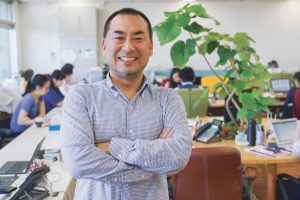The Chitose Group, founded by scientist and entrepreneur Tomohiro Fujita, aims to help Japan become a global leader in biotech through algae manufacturing and other sustainable practices. According to Fujita, Japan’s most successful biotech companies, such as Kyowa Kirin and Ajinomoto, have been able to grow to the behemoths they are today due to their humble roots in traditional Japanese practices, like fermentation.
Chitose itself grew out of Neo-Morgan Laboratory, for which Fujita used to work before he bought it out in 2009 on the heels of a global recession. The acquisition was a risky move, but as Fujita advises, “When you can’t decide on the path to follow, take the harder one.”
Now considered one of Japan’s leading biotech companies, Chitose employs 120 people in Japan and Singapore, all working towards “Transforming the world to how it should be, one step at a time.” Their projects include everything sustainable – from food to medicine to fertilizer.
One of their biggest recent projects is a partnership with Eneos, a Japanese manufacturer of fuel and lubricant. With Eneos, Chitose is developing algae-based fuels for use in jets. Worldwide enthusiasm for fossil fuels is waning, especially as more efficient methods of producing biofuels continue to crop up around the globe. Fujita has thrown his hat into the algae-based jet fuel ring as industry regulations are now increasing the percentage of biofuel that must be present in the mix.
The Sarawak Biodiversity Center (SBC) and Mitsubishi Corporation (MC) partnered with Chitose to develop the largest microalga cultivation facility in Malaysia. Opened in 2019, the facility collects and grows local microalgal strains. Algae from the facility can be used for a variety of biofuel and pharma projects, and currently gives back to the community by providing feed and water conditioner to commercial shrimp producers.
However, Fujita’s grandest plan so far is his Bio Eco Town – an entire city in Brunei whose economy will be fully biobased. Bio Eco Town will recycle all materials, and will create food, fuel, and chemicals derived from algae in what Fujita refers to as a “photosynthesis-based society.” While the COVID-19 pandemic has delayed plans, he still hopes the city will be open by 2030.























